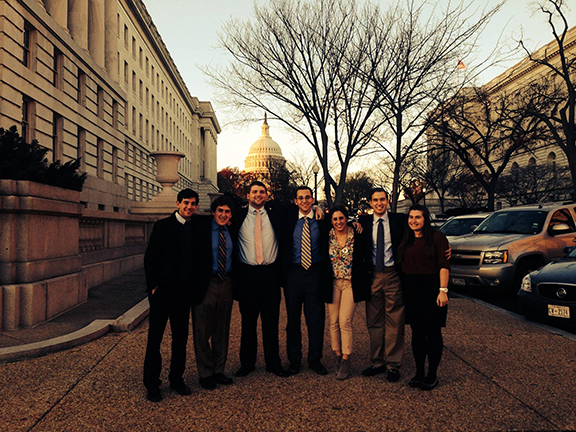
Terps for Israel
Clarification: Terps for Israel group members have met with Congress members in the past to talk about co-sponsoring various legislative acts such as the Nuclear Iran Prevention Act. The bill passed in the House with a vote of 400-20. Additionally, government and politics major Max Meizlish was incorrectly identified. He is a junior. The story has been updated to reflect these changes.
There are only less than 10 miles separating this university from Capitol Hill, and junior Max Meizlish said he wants to make the most of that proximity.
Meizlish and other members of Terps for Israel met Tuesday with members of Congress representing states from Texas to New York to lobby for a renewed commitment to the U.S.-Israel relationship.
“I think that, as a student organization, the best way to support Israel is to focus our attention on the 535 members of Congress. Students at the University of Maryland, because of how close we are to D.C., have a voice that can be heard and should be heard,” Meizlish, a government and politics major, said. “With their passion and commitment to the issues, our members can influence congressional staffers and members regarding the U.S.-Israel relationship in a really positive and effective way.”
The group’s trip to Washington focused on building relationships between members of Terps for Israel and members of Congress. Meizlish said he wants legislators to know that their willingness to stand by Israel is valued.
“When we leave every office, we hope that each member of Congress or staff member comes away understanding that we greatly appreciate their support and commitment in strengthening and securing the U.S.-Israel relationship,” he said.
In the past, the student group has asked Congress members to co-sponsor various legislative acts, such as the Nuclear Iran Prevention Act.
This bill, which passed in the House with a vote of 400-20, strengthens enforcement of current U.S. sanctions on Iran, expands sanctions targeting Iran’s human rights violations, and, for the first time, specifically authorizes the president to impose sanctions on any entity that maintains significant commercial ties to Iran.
Meizlish said he supports both the content of the act as well as its bipartisan nature — the bill is sponsored by Rep. Ed Royce, R-Calif., and Rep. Eliot Engel, D-N.Y.
“Its great when you see members from both sides of the aisle stand hand-in-hand saying, ‘I support the U.S.-Israel relationship,’” he said. “This isn’t a partisan issue; it’s something that’s in our national interest as Americans.”
Terps for Israel members also urged lawmakers to support the full 2014 foreign aid budget, which includes $3.1 billion in military aid to Israel. A Memorandum of Understanding signed in 2007 by the administrations of then-President George Bush and then-Prime Minister Ehud Olmert guarantees $30 billion in aid to Israel over the course of 10 years.
While that may seem like a lot of money going to one small country, Meizlish said, only 1 percent of the U.S. budget goes to foreign aid, and about 75 percent of Israel’s aid is spent back in the U.S. on military equipment.
“Israel is a democracy — the only one in the Middle East — and it’s our strongest ally in the Middle East,” he said.
Establishing ongoing relationships with congresspeople that will last for years to come is an important goal for the organization, because “lobbying once is an oxymoron,” Meizlish said.
Of the 11 students who made the trip to Capitol Hill, four were freshmen, including Michael Krasna, a government and politics major.
Krasna said has been to Israel more than 10 times and spent a gap year there before coming to the university.
“I grew up in a very Zionistic home, and I’ve always felt a very strong connection to Israel and Judaism as a whole,” he said. “I want to make sure the U.S. always stands by Israel.”
Lobbying with Terps for Israel was a powerful experience, Krasna said.
“There were times during the day when I had an ‘aha’ moment, like, ‘Wow, I’m really here and able to sit down with a member of Congress and talk about the issues,” he said. “I hope in the future we get to visit more offices and get the word out even more. A lot of members of Congress talked about how good it was to see college students come out.”
Jonathan Levi, a sophomore government and politics major, said he hoped the experience was beneficial for both students and legislators.
“We hope our visits will guide members as they consider issues that impact the U.S.-Israel relationship,” Levi wrote in an email. “Not only did our lobbying mission show TFI’s support for Israel, it gave the student members a firsthand look into the legislative process.”



